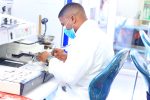The mobile planetarium team of the Africa Millimetre Telescope (AMT) project has been honoured by the UK’s Royal Astronomical Society (RAS) with the 2024 Annie Maunder Medal for Outreach. The mobile planetarium is used to bring immersive and interactive astronomy engagement to a diverse spectrum of the Namibian public and help to bridge the gap between scientists and the public as well as top-level government. For these reasons the medal was awarded to the internationally operated project.
The RAS commends the innovative nature and potential of the project: “In spite of magnificent night skies, the wider public in Namibia has little knowledge or appreciation of the astronomical research done in their country. This means that the potential of astronomy to inspire and stimulate interest in “blue skies research” is being missed. The mobile planetarium project of the Africa Millimetre Telescope is helping to realise this potential by bringing an immersive astronomical experience to schools across Namibia.”
The Africa Millimetre Telescope project is an international cooperation between Radboud University and the University of Amsterdam in The Netherlands, the University of Namibia, Oxford University in the UK, and the University of Turku in Finland. The first millimetre-wave radio telescope on African soil will be built in the Khomas Highlands of Namibia and is designed to expand the Event Horizon Telescope network, which captured the first ever image of a black hole, released in 2019.
The mobile planetarium is the flagship outreach project of the AMT collaboration.
It is modelled on the successful mobile planetarium project managed by the Dutch Research School for Astronomy (NOVA) in The Netherlands. Marc Klein Wolt of Radboud University and AMT project director: “Due to Namibia’s large size, few scientific outreach programs reach all corners of the country, resulting in little interest in science in general amongst the wider population”. Klein Wolt continues: “A mobile planetarium is portable; all equipment fits in the back of a car. So we thought, why not bring a planetarium to Namibia and help all Namibians benefit from our project and actually become a part of it.”
A mobile planetarium is an effective tool for astronomy education and public engagement. The night sky is projected onto the inside of the inflatable dome via a powerful projector. State-of-the-art planetarium software enables the operator to ‘fly’ through the universe and show a myriad of astronomical phenomena.
The AMT Mobile Planetarium project is a combined effort of an energetic team of University of Namibia (UNAM) students and staff, fuelled by technical support from the Radboud University and NOVA. The team is diverse in nature and comprises project leaders, technical experts and student presenters. The AMT Mobile Planetarium project has reached an extremely diverse audience across Namibia from kindergarten children to university students; from rural school children to Heads of State. In its first year of operations, the project visited more than 70 locations and conducted more than 400 planetarium shows, which were attended by more than 10,600 Namibians. The planetarium project now receives extended sponsorship in Namibia. The local support enables the expansion of the team with new student presenters in 2024. The goal is to reach all learners at least once during their school career.
Lott Frans, AMT Fellow and the first astrophysics PhD student in Namibia: “For Namibia to play an active part in such exciting science at the highest level is exciting! We are honoured to be a part of the team and to contribute to equipping our young people with the necessary skills to keep our place at that scientific level.” Frans continues: “Projects such as the AMT Mobile Planetarium enthuse learners from a young age for science and enable capacity building to tackle the big global challenges for the future. It is such a diverse and exciting way to learn, and we are honoured the RAS recognises our efforts with this award. It really means a lot to the team and to Namibia.”










